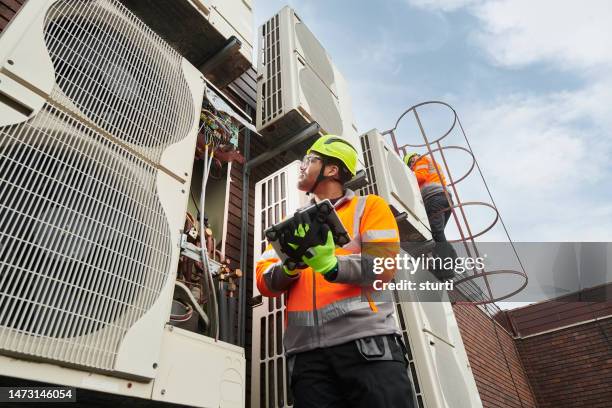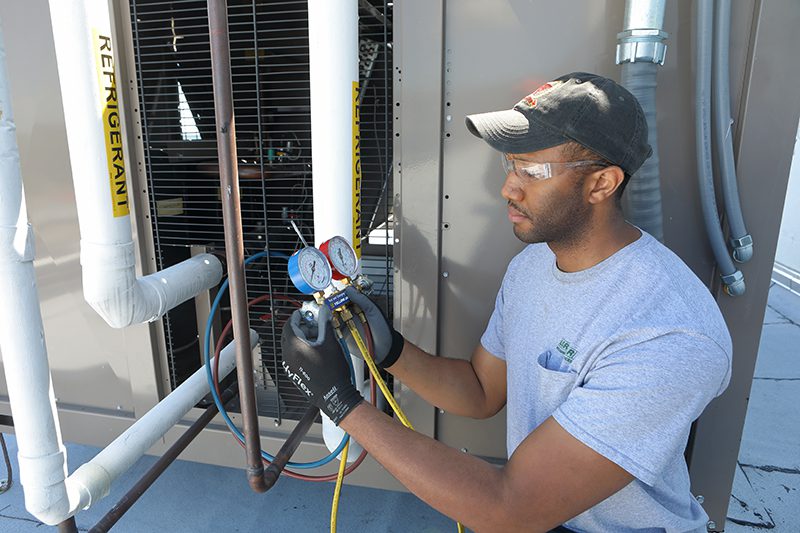Discovering the Newest Developments in Heating And Cooling Technology for Home Convenience
In an age characterized by quick technological advancements, the cooling and heating market is no exception. New advancements, from smart thermostats to solar-powered systems, are consistently improving the landscape of home environment control. These strides not only improve personal comfort but also advertise energy efficiency and environmental sustainability. As we unpack these growths, you'll uncover just how they are changing a/c innovation, creating a much more comfortable and eco-conscious future.
Recognizing the Basics of HVAC Solutions
Although heating and cooling systems may seem facility at a glimpse, their basic principles are quite straightforward. The phrase cooling and heating means Home heating, Air Flow, and A/c, which succinctly outlines the system's key functions. HVAC systems function to maintain a comfortable and risk-free interior environment, no matter outside weather conditions. They control air, humidity, and temperature quality within a structure with a collaborated process of heating or cooling down the air, aerating stagnant air out and fresh air in, and removing pollutants. Effective cooling and heating systems are identified by their capacity to carry out these features while reducing energy consumption. It is very important to recognize these basics before delving right into the current technology advancements in this area.
The Function of Smart Thermostats in Modern Cooling And Heating Innovation
Despite showing up as a small component, clever thermostats play a crucial function in contemporary Heating and cooling technology. Clever thermostats can provide beneficial data concerning power usage patterns, helping house owners comprehend and decrease their power usage. As Heating and cooling systems come to be a lot more sophisticated, the combination of wise thermostats is likely to continue, enhancing both user benefit and system efficiency.
The Effect of Energy-Efficient Heating And Cooling Systems on the Environment
The arrival of energy-efficient heating and cooling systems has significant ramifications for the atmosphere. These systems are important to decreasing the carbon impact, playing an important duty in promoting lasting living. Furthermore, they have the added benefit of decreasing power intake, paving the means for a greener future.
Lowering Carbon Footprint
In a period where environmental worries are critical, energy-efficient cooling and heating systems are emerging as a vital remedy. These systems, making use of sophisticated modern technologies, not just offer better comfort in homes but also considerably lower carbon exhausts, a major factor to worldwide warming. By optimizing energy usage, they curtail the burning of nonrenewable fuel sources for heating and cooling objectives, causing a reduced carbon impact. Developments such as geothermal heat pumps and solar-powered systems better improve this impact, harnessing natural resources without the involved ecological influence. The fostering of such energy-efficient HVAC systems is a forward action in mitigating environment adjustment, making certain a healthier, extra lasting setting for future generations.
Promoting Sustainable Living
These sophisticated HVAC systems decrease greenhouse gas exhausts and reduce dependence on non-renewable resources. The development in Cooling and heating innovation is not only transforming the sector yet additionally shaping the future of sustainable living. The adoption of energy-efficient Cooling and heating systems is an action ahead in creating a more sustainable and environmentally-friendly world.

Decreasing Energy Consumption
Significant strides have been made in the realm of cooling and heating technology, with certain focus on decreasing power intake. High-efficiency cooling and heating systems are quickly ending up being the norm, integrating smart modern technologies to optimize performance. These systems supply considerable energy savings, substantially minimizing a home's carbon footprint and energy costs.

Inevitably, these technologies not only lower power consumption however likewise add to the international goal of sustainability, highlighting the substantial impact of energy-efficient HVAC systems on the setting.

Exploring the Possible of Solar-Powered Heating And Cooling Systems
Could the future of air, ventilation, and home heating conditioning depend on the power of the sunlight? As the globe moves in the direction of renewable resource, solar-powered HVAC systems mark an interesting development in the market. These systems harness sunshine, converting it into power for cooling and heating of homes. The technology, though still in its nascent phases, provides encouraging potential for power efficiency and sustainability. One of its crucial advantages is the substantial reduction in electrical energy costs, provided the totally free and limitless source of solar energy (DMAK's HVAC Edwardsville IL Experts). Nevertheless, preliminary installation costs and stability in areas with less sunlight remain challenges. Yet, as developments in solar innovation proceed, solar-powered cooling and heating systems can reinvent home comfort, giving an environmentally friendly option for future generations.
The Advantages of Cooling And Heating Zoning Solutions for Ideal Home Comfort
Why endure discomfort in one part of your home while one more area continues to be flawlessly comfortable? Heating and cooling zoning systems answer this inquiry. They permit customized temperature level setups in various areas of a residence. This customization improves total convenience and gets rid of unnecessary energy intake in extra areas, causing considerable power financial savings. Most systems make use of automated dampers in the ductwork, which open and close based on the established preferences, routing air movement precisely where required. Some advanced models even use remote control access via smartphones for hassle-free changes. The capacity to control temperature level individually in different zones additionally boosts the lifespan of heating and cooling tools by decreasing overuse. Thus, HVAC zoning systems use a clever, energy-efficient solution for optimum home comfort.
Future Fads and Predictions in Cooling And Heating Modern Technology
As the globe of a/c modern technology remains to evolve, there are a number of significant patterns and improvements that are anticipated to form the market's future. These consist of the growth of sophisticated smart thermostats, the assimilation of man-made Recommended Site intelligence (AI) right into heating and cooling systems, and a boosting emphasis on sustainability. These fads are established to change heating and cooling technology, offering potential advantages in terms of efficiency, ease, and ecological influence.
Smart Thermostats Innovations
Envision the convenience of controlling your home's temperature with a simple click on your smart device. They can additionally supply energy usage records, helping home owners make notified choices. Forecasts suggest further improvements, such as incorporating indoor air quality control, enhancing the overall home environment.
AI-Driven Heating And Cooling Equipments
While the advancement of wise thermostats has actually substantially influenced heating and cooling technology, the future hinge on expert system (AI)- driven systems. Advanced AI algorithms are being integrated into a/c systems to enhance efficiency, predict possible problems, and offer real-time information analysis. These systems can pick up from past experiences, adapt to changes, and choose based upon trends and patterns. They can additionally respond to voice commands, making individual interaction extra smooth and hassle-free. Predictions recommend that AI will certainly transform cooling and heating modern technology, bring about considerable power savings and enhanced convenience. As AI continues to advance, the capacities of these innovative systems are anticipated to improve, using unprecedented control and modification for home comfort.
Sustainability in HVAC Technology
The capacity for AI to revolutionize heating and cooling modern technology is clear, yet there is an additional dimension to the future of cooling and heating systems that is worthy of focus: sustainability. The a/c sector is progressively focusing on environmentally friendly techniques. Innovations include energy-efficient systems that lower carbon exhausts and lower power bills. Use of solar energy and geothermal energy for home heating and cooling gets on the rise. Companies are creating systems with intelligent thermostats that change the temperature based on tenancy and use patterns, adding to energy financial savings. Energy recuperation ventilators, which reuse power from exhaust air to heat or great incoming fresh air, are additionally getting grip. Therefore, the future of a/c innovation holds promise for both boosted comfort and sustainability.
Conclusion
To conclude, the rapid advancement of heating and cooling technology is leading the way for enhanced home comfort and energy efficiency. With technologies such as smart thermostats, solar-powered systems, and real-time information evaluation, property owners can delight in individualized climate control while promoting sustainability. As this sector remains to progress, it's prepared for that these innovations will a knockout post not only transform home convenience however likewise contribute substantially to ecological preservation.
Efficient Heating and cooling systems are defined by their capability to execute these functions while decreasing power consumption. As A/c systems come to be a lot more innovative, the combination of smart thermostats is likely to continue, enhancing both user comfort and system performance.
As the world changes in the direction of sustainable energy, solar-powered A/c systems note an interesting development in the sector. As developments browse this site in solar technology proceed, solar-powered Cooling and heating systems might reinvent home comfort, providing an environmentally friendly solution for future generations.
